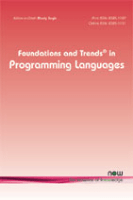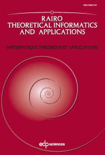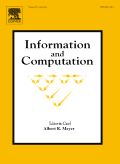
Logical Methods in Computer Science
metrics 2024
Championing open access to pioneering logical research.
Introduction
Logical Methods in Computer Science is a premier Open Access journal dedicated to fostering scholarly dialogue within the realms of Computer Science and Theoretical Computer Science. Established in 2004 and published by LOGICAL METHODS COMPUTER SCIENCE E V in Germany, this journal aims to bridge theoretical frameworks and practical applications, providing a platform for innovative research and discoveries. With an impressive HIndex reflecting its commitment to high-quality research, Logical Methods in Computer Science has achieved a Q2 ranking in both the miscellaneous and theoretical categories of computer science, indicating its growing influence in the academic community. Researchers, professionals, and students are encouraged to access and engage with the wealth of knowledge this journal offers, which is freely accessible to facilitate widespread dissemination of cutting-edge advancements in logical methods. With its convergence period extending from 2005 to 2024, Logical Methods in Computer Science continues to be a vital resource for those looking to explore the intersections of logic, computation, and mathematics.
Metrics 2024
 0.57
0.57 0.60
0.60 0.70
0.70 41
41Metrics History
Rank 2024
Scopus
IF (Web Of Science)
JCI (Web Of Science)
Quartile History
Similar Journals

Foundations and Trends in Programming Languages
Exploring the Core Principles of Programming LanguagesFoundations and Trends in Programming Languages, published by NOW PUBLISHERS INC, is a premier journal that plays a pivotal role in advancing the field of programming languages. With an ISSN of 2325-1107 and an E-ISSN of 2325-1131, this journal is renowned for its scholarly contributions, receiving a notable impact factor and achieving a distinguished Q1 ranking across multiple categories, including Computer Science Applications, Software, and Theoretical Computer Science in 2023. The journal has sustained a significant trajectory of growth since its inception in 2014, showcasing an impressive Scopus ranking, which places it in the top percentile of its respective fields. Although this journal operates under a traditional access model, its commitment to publishing high-quality, peer-reviewed research ensures that it remains an essential resource for researchers, practitioners, and students alike, fostering deep insights and innovations in the theoretical and practical aspects of programming languages.

Logic and Logical Philosophy
Fostering Dialogue in Logical PhilosophyLogic and Logical Philosophy is a distinguished journal published by Nicolaus Copernicus University Torun, Poland. With its ISSN 1425-3305 and E-ISSN 2300-9802, the journal has established itself as a premier outlet for cutting-edge research in the field of philosophy, specifically focusing on the intricate intersections of logic and philosophical inquiry. Since its inception, the journal has consistently demonstrated its impact within the academic community, achieving a commendable Q1 ranking in the 2023 Arts and Humanities category, placing it in the 73rd percentile of publications in the field. The journal aims to foster scholarly dialogue and contribute significantly to the advancement of philosophical understanding through rigorous research articles, critical reviews, and discussions. With a commitment to high academic standards and accessibility—though specific access options may vary—Logic and Logical Philosophy remains an essential resource for researchers, professionals, and students alike, paving the way for innovative philosophical discourse until 2024 and beyond.

Scientific Annals of Computer Science
Empowering Researchers to Shape Tomorrow's TechnologiesScientific Annals of Computer Science, published by Alexandru Ioan Cuza University of Iasi, Romania, is an esteemed open access journal that has been disseminating knowledge since 2007. With the ISSN 1843-8121 and a focus on the fields of applied mathematics and computer science, this journal supports researchers and practitioners by providing a platform for innovative ideas and substantial advancements in computational methodologies. Despite its current Q4 ranking in both Applied Mathematics and General Computer Science categories, the journal is dedicated to expanding the horizons of scientific inquiry through the convergence of theoretical and practical perspectives. Covering research from 2009 to 2024, the journal aims to elevate scholarly communication and ensure accessibility by presenting its articles free of charge, inviting contributions that can shape the future of technology and mathematics. By embracing an open access model, Scientific Annals of Computer Science aligns with the global movement towards making scientific knowledge universally accessible, thereby fostering collaboration and knowledge-sharing among researchers, professionals, and students alike.

RAIRO-THEORETICAL INFORMATICS AND APPLICATIONS
Advancing Knowledge in Computer Science and Mathematics.RAIRO - Theoretical Informatics and Applications is a renowned academic journal published by EDP Sciences S A that has been at the forefront of disseminating innovative research and applications in the fields of computer science and mathematics since its inception in 1995. With a focus on theoretical and applied aspects of informatics, the journal serves as a vital resource for researchers and professionals seeking to explore the intricacies of computational theories and their practical applications. Although currently lacking an Open Access model, it provides invaluable insights from distinguished researchers within its Q4 category rankings across its pertinent fields. As reflected in its Scopus rankings, including a position in the 24th percentile for General Mathematics and the 9th percentile for Computer Science Applications, RAIRO is pivotal in contributing to the ongoing discourse and advancements in theoretical informatics. Researchers, professionals, and students will find this journal critical in understanding emerging trends and challenges in the rapidly evolving domains of computer science and mathematics.

FORMAL ASPECTS OF COMPUTING
Advancing the Frontiers of Formal Methods in ComputingFORMAL ASPECTS OF COMPUTING is a distinguished journal published by the ASSOCIATION FOR COMPUTING MACHINERY, dedicated to the fields of Software Engineering and Theoretical Computer Science. With the ISSN 0934-5043 and E-ISSN 1433-299X, this journal has made a significant impact in its categories, achieving a Q3 ranking in both Software and Theoretical Computer Science as of 2023. The journal spans over three decades since its inception in 1989, providing a platform for high-quality research that addresses critical formal methods and their applications in computing. While it currently does not offer open access, it remains an essential resource for researchers and practitioners in the field. The journal's credibility is bolstered by its Scopus rankings, placing it in the top half of both theoretical and software-related fields. By engaging with current trends and fostering innovative approaches, FORMAL ASPECTS OF COMPUTING stands as a vital repository of knowledge and a catalyst for future advancements in the discipline.

ACTA INFORMATICA
Unveiling Breakthroughs in Computer Networks.ACTA INFORMATICA is a prestigious academic journal published by Springer, dedicated to advancing the fields of computer networks and communications, information systems, and software engineering. With an ISSN of 0001-5903 and an E-ISSN of 1432-0525, the journal has continued to thrive since its inception in 1971 and is set to cover research up until 2024. Although it currently operates within a Q3 category in its respective fields, it is recognized for providing a platform for high-quality, peer-reviewed research, which is essential for fostering innovation and knowledge dissemination in computer science. While it does not offer an open access option, scholars benefit from its rigorous editorial standards and comprehensive coverage of significant trends and methodologies. The journal is conveniently based in New York, NY, USA, further enhancing its accessibility to a global audience. Researchers, professionals, and students alike will find ACTA INFORMATICA a valuable resource for staying abreast of the latest developments and breakthroughs in this vital area of study.

JOURNAL OF AUTOMATED REASONING
Pioneering Innovations in Computational TheoryJOURNAL OF AUTOMATED REASONING is a premier academic journal published by SPRINGER, focusing on the dynamic and evolving fields of Artificial Intelligence, Computational Theory and Mathematics, and Software. With an ISSN of 0168-7433 and E-ISSN 1573-0670, this journal ranks impressively in the second quartile (Q2) across multiple categories, reflecting its significant contribution to the advancement of knowledge in automated reasoning methodologies. Since its inception in 1985, it has served as a vital platform for researchers and professionals to share groundbreaking findings and innovative techniques, facilitating the exploration of algorithms, logical frameworks, and reasoning processes that underpin artificial intelligence systems. Although it does not currently offer Open Access options, it remains a highly regarded resource, cited widely in academia, with its impactful publications reflecting deep insights and rigorous scholarly standards. The journal’s esteemed status and its ongoing commitment to fostering a greater understanding of automated reasoning make it an invaluable asset for those dedicated to pushing the boundaries of these interdisciplinary fields.

FUNDAMENTA INFORMATICAE
Fostering Excellence in Informatics Research Since 1988.FUNDAMENTA INFORMATICAE is a distinguished academic journal published by IOS PRESS, focusing on the critical intersection of informatics, mathematics, and computer science. Since its inception in 1988, this journal has served as a vital resource for researchers and professionals alike, providing a platform for innovative studies in Algebra and Number Theory, Computational Theory and Mathematics, Information Systems, and Theoretical Computer Science. With an impressive HIndex, and ranking in the Q3 and Q4 categories across various disciplines as of 2023, it underscores its contribution and relevance in advancing the body of knowledge in these fields. The journal's commitment to excellence is reflected not only in its rigorous peer-review process but also in its notable rankings on Scopus, which positions it favorably among its peers. Though not yet available as an open access journal, FUNDAMENTA INFORMATICAE remains a crucial academic venue for authors wishing to disseminate their findings to a global audience, promoting collaboration and further research within the scientific community.

INFORMATION AND COMPUTATION
Exploring the Synergy of Information and ComputationINFORMATION AND COMPUTATION is a peer-reviewed academic journal published by Academic Press Inc., Elsevier Science, dedicated to advancing the fields of computational theory and mathematics, computer science applications, and information systems. With an ISSN of 0890-5401 and an E-ISSN of 1090-2651, the journal provides a platform for innovative research that spans theoretical and applied perspectives. Acknowledged for its impact in the community, it holds a Q2 quartile ranking in several categories, including Computational Theory and Mathematics and Computer Science Applications, as of 2023. These rankings place it among the leading journals in its field, making it an essential resource for researchers, professionals, and students aiming to stay abreast of cutting-edge developments. While it does not currently offer Open Access options, the journal intends to foster scholarly communication and knowledge sharing from its inception in 1987 to its future issues expected through 2024. Located in the United States, at 525 B ST, STE 1900, SAN DIEGO, CA 92101-4495, INFORMATION AND COMPUTATION is committed to publishing high-quality research that influences the theoretical foundations and practical applications of its diverse disciplines.

Frontiers of Computer Science
Exploring the Nexus of Theory and Application in Computer ScienceFrontiers of Computer Science is a leading peer-reviewed journal dedicated to advancing the field of computer science through the publication of high-quality research articles, reviews, and theoretical discussions. Published by HIGHER EDUCATION PRESS, this journal has gained significant recognition, currently boasting a prestigious impact factor and ranking in the Q1 quartile for both Computer Science (miscellaneous) and Theoretical Computer Science categories in 2023. With a focus on the intersection of computational theory and practical applications, it serves as a vital platform for researchers, professionals, and students alike who are eager to contribute to and stay updated with groundbreaking developments. The journal’s scope encompasses a wide range of topics, reflecting the diverse nature of computer science today. Operating from Beijing, China, it emphasizes Open Access, ensuring that vital research is readily available to the global academic community. With its convergence period spanning from 2013 to 2024, Frontiers of Computer Science remains committed to fostering innovation and scholarly dialogue that drives the future of technology.